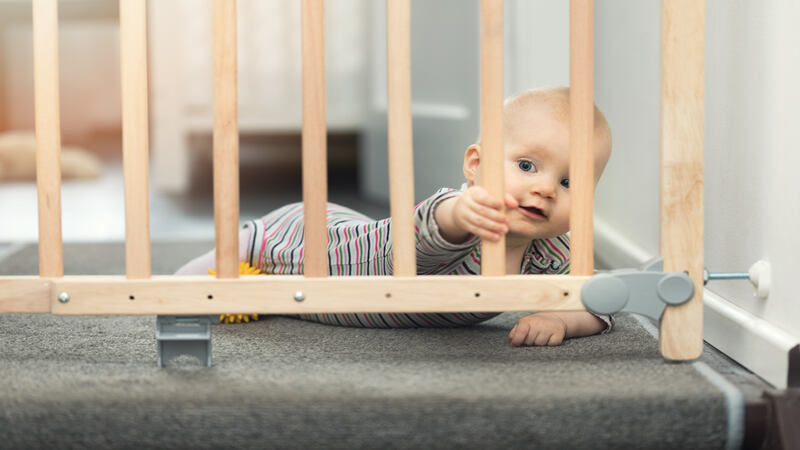
1. My child has just started crawling. What should I keep in mind with respect to the safety of my child?
- Infants have a lot of unique features which we need to keep in mind which may put them at a safety risk
- They have large heads making them top heavy and appealable. So when infants and young children fall from a height, the head will hit the ground first.
- They have very weak legs. The physical development happens in head to toe direction. The legs become strong very late. Infants cannot wriggle out of danger.
- They mouth everything. The fine senses in infants are maximum in tongue and mouth. So kids explore everything handy by putting it into their mouth. That can sometimes be dangerous with choking hazards, harmful chemicals, and button batteries.
2. How do I baby proof my home and surroundings?
It is the responsibility of adults to work out what might hurt a child and to work out how to keep young children safe. There is a set of steps that you can follow in order to best protect a child.
Get rid of the danger
For example: If you have been using chemicals in the garden, throw away any chemical that is left over. Change the hazard so that it is not so dangerous
For example: Many children are hurt when they fall off bunk beds. Put the top-level bed down onto the floor so you have two low beds.
Lie your ladder down on the ground.
Avoid keeping table and stool next to balcony parapet or windows
Make the child’s outside play area a long way from where the car goes.
Block access to the danger
For example: Put medicines and cleaning chemicals into a locked cupboard, and take the key out (or use a ‘child-proof’ cupboard). Always take the keys out of the car.
Change the child so that the risk is lowered
This may sound strange but it means things like:
- Making sure that the child always wears a helmet when riding a bike, or wrist and knee protectors when skating.
- Use sun-protecting clothes.
Always do things the safe way yourself
Children learn from what you do! For example:
- This is particularly important in driving the car. Teenagers’ way of driving is strongly influenced by the way their parents drive.
- Follow traffic rules while driving and also as a pedestrian
Help them learn skills so that they do things the right way
For example: If you have a tree that ‘needs’ to be climbed, help them learn how to climb down again. Help them learn how to use a knife safely.
Teach them by telling them what to do, and what not to do
Even though small children cannot understand all you say, eventually they will learn to control their own behavior For example, talk to them about stopping at the traffic lights, pushing the button, going when the walk sign turns green. However, even if small children can tell you all the steps, you still have to be in control.
- Finally, if they are doing something you think is dangerous, stop it.
- Pick them up and put them somewhere safe (you are the adult, and you are bigger).
- If they are too far away, shout something very simple, very loudly, like STOP!!! Don’t say any more words – you need them to concentrate on stopping.
Reminders
- Have emergency phone numbers near the phone: police, ambulance, fire
your doctor - Have a first aid kit in the house and car.
- Check that homes and public places you visit with your child are safe.
- Do a first aid course which includes emergency resuscitation, so that you will know what to do.
3. My children have no clue about the dangers. He is extremely fearless. Is it normal?
- Young children cannot understand the danger. They cannot understand that they might get hurt or even killed even when you have told them about the danger.
- Young children can understand ”Stop” or “no”, but they cannot understand “Do not run onto the street because you will get hit by a car”.
- They are too busy concentrating on running without falling over, and anyway, they did not get hit by a car last time they ran on the road. Toddlers may understand “no” but they may not have learned to obey it yet.
- Young children only look at where they are going to (chasing a ball, running to a friend) – they have ‘tunnel vision’.
- They cannot judge whether something, such as a car, is moving, or how fast it is moving.
4. My toddler loves the kitchen. When can I start teaching my kid cooking without compromising safety?
- For a toddler in Indian kitchen, the egg turning into an omelet or a puri fluffing up in hot oil is magic. But many times their curiosity gets better of their sense and mishaps to happen.
- Inside the kitchen, there should be no role play.
- All long handle vessels, the handles have to be turned towards the wall.
- Keep children out of the kitchen
5. What is the right age for making my kids join swimming classes?
- Kids only above 4 years should be allowed to join swimming classes. The coordination between breathing, hands, and legs will take 4 years to mature at least.
- It will however always require that the adult accompanying the child keeps one to one watch when a child is in the pool. And no distractions like mobile.
- Children should wear bright headgear when in a pool.
- They should never get into unknown water bodies because drowning risks are very high.
